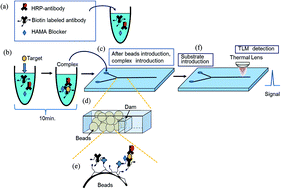A sensitive and rapid assay of BNP in patient blood by micro-ELISA
Abstract
Microfluidic immunoassays are expected to be the next-generation diagnostic methods due to the small size of the reaction space and their high performance. Various tests are performed in clinics or for home medical care. However, the analytical markers are restricted in comparison to the clinical tests performed in medical facilities. We developed a microfluidic ELISA (micro-ELISA) system, which utilized a microfluidic device for reactions and a thermal lens microscope (TLM) for detection. This system allowed a very sensitive and rapid assay due to the small size of the reaction space. In this study, to apply this system for clinic use, we investigated the detection of an unstable and low concentration (pg mL−1) marker in patient's plasma. Among the various markers, brain natriuretic peptide (BNP), a heart failure marker, was chosen because BNP is one of the difficult markers to handle in clinics and at home due to its instability (biological half-life: ∼20 minutes); moreover, its activity in the patient's sample declines within several hours. To overcome these problems, we investigated the chemical procedure. A streptavidin-beads/biotin–antibody reaction was applied because of its high association constant, and a one-step pre-mixed method was developed for a facile process and higher sensitivity. However, commercial standard BNP with sodium azide cannot be used in this pre-mixed method because sodium azide will inhibit the activity of HRP. Therefore, the preparation and preservation stability of the standard sample was evaluated. To maintain the stability of BNP, a buffer solution containing aprotinin was used for dilution in our investigations. In addition, to reduce the influence of the viscosity changes in patient's blood samples, a dilution procedure was also considered. Based on these investigations, the quantitative analysis of BNP in only 10 μL of patient's plasma was successfully realized, whereas the conventional 96-well microtiter plate method required about 500 μL of plasma sample. Moreover, a superior performance was demonstrated in the limit of quantitation (3.61 pg mL−1) and short assay time (20 min for 1 sample and 70 min for 5 samples). An excellent correlation was shown between the conventional method used in the University of Tokyo Hospital and our micro-ELISA method.



 Please wait while we load your content...
Please wait while we load your content...